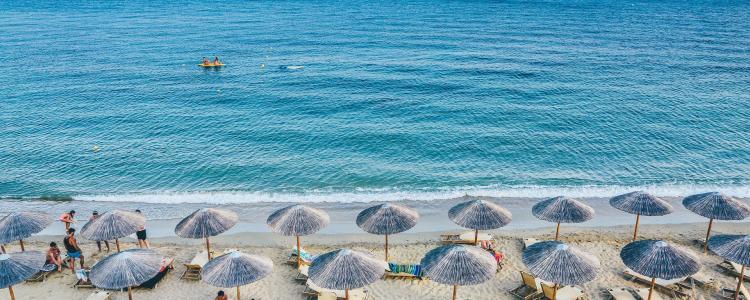Many travellers choose the all-inclusive holiday abroad. With flights, transfers, hotel, and of course food and drink all included in the price of the holiday, it’s a popular and affordable style of travel for many.
The all-inclusive holiday can be experienced in many countries around the world from Europe to Africa, Central America and the Caribbean.
Although travellers choosing this type of holiday generally do not face the same number of travel health risks as independent travellers, there are some particular travel health risks that the all-inclusive traveller should be aware and prepared for.
Sun Bathing
For many travellers sunbathing round the pool with a good book and free drink from the bar is the main part of their all-inclusive holiday experience. Getting some vitamin D from the sunlight is good for healthy bones and wellbeing, however too much sun can lead to sunburn and dehydration. We also know that it accelerates skin aging and is a risk factor to skin cancer. UV rays from the sun are usually strongest between 11am and 4pm. Sunbathing should be limited and time should be spent in the shade. A high factor sunscreen with UVA and UVB protection should be applied frequently, especially after swimming.
Although travellers choosing this type of holiday generally do not face the same number of travel health risks as independent travellers, there are some particular travel health risks that the all-inclusive traveller should be aware of and prepared for
Mosquito Bites
Not all all-inclusive holidays are in countries where mosquitoes transmit malaria; however other mosquito borne infections such as Dengue and Chikungunya may be a risk. Regardless of risk of infection, mosquito bites can cause swelling, itching and can be a risk for infection. Bite prevention even in air conditioned hotel rooms is important. Windows should stay closed and sealed and air conditioning/ room fans switched on. Room vaporisers plugged into the electric point and switched on in the evenings can also provide excellent protection. During the daytime and evening, arms and legs should be covered with loose clothing where possible and insect repellent such as DEET applied to exposed skin. If required, malaria tablets should be taken as prescribed.
Itching and swollen bites can be managed with use of an oral and or topical antihistamine cream. A mild steroid cream such as hydrocortisone can also be considered. These products should be to hand in your medical kit.
Travellers’ diarrhoea
Eating and drinking are some of the main pleasures of an all- inclusive holiday; however precautions have to be taken to reduce the risk of Travellers’ diarrhoea. Diarrhoea can be caused by increased alcohol consumption; however it is often caused by contaminated food and water. Buffets catering for many guests are a risk if food is poorly cooked and over handled. Choose food that is piping hot, avoid shellfish and seafood and watch out for flies. If you see them on or around food consider eating somewhere else. Be very careful with raw vegetables, salads and chopped fruit. If it has been washed in local water supplies it will high risk for spreading infections that cause diarrhoea particularly in low income countries outside of northern Europe. Avoid these foods or ask the restaurant how these foods have been prepared.
Bacteria that cause diarrhoea can be spread through poor hand hygiene so avoid handling food and wash hands thoroughly before eating. Use of alcohol hand sanitiser is also very effective. Symptoms of diarrhoea can be managed with Loperamide and rehydration salts. Antibiotics such as Ciprofloxacin or Azithromycin can be used to self treat severe Travellers’ diarrhoea.
Water safety and accidents
Water related accidents and drowning are constantly reported in holiday makers. Balcony accidents are particularly common in young people. Many are killed or suffer serious injuries from climbing across balconies or diving off into swimming pools below. Often excessive alcohol consumption is a factor involved in these accidents. Be aware of balcony risks and look out for others who are vulnerable.
It is important to be aware that life guards are not always present at beaches or hotel swimming pools. Parents should closely supervise children and toddlers at all times around water. Sadly drowning is the second leading cause of accidental death in children abroad.
Medical Kit
Accidents and illnesses happen abroad. No one likes to think of them happening on their holiday but it is important that you are prepared and that you travel with a personal medical kit. Some holiday resorts have small medical clinics on site however facilities may be quite basic and the level of medical knowledge may be poor depending on the knowledge of the healthcare provider. There is a lot of counterfeit medication in low income and developing countries so it is not ideal to rely on local pharmacies when quality cannot be assured. Prepare in advance. Medical kits should include antiseptic spray/wash, a range of plasters and dressings, antihistamines, painkillers such as Paractetamol, loperamide, rehydration salts and sterile needles and syringes (if in a country with limited access to safe medical supplies). Antibiotics for the self treatment of severe diarrhoea should also be considered.


No Comments
Be the first to start a conversation